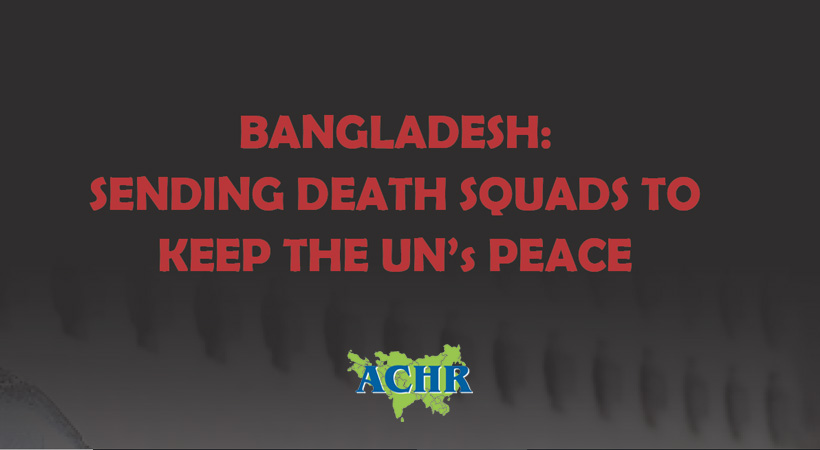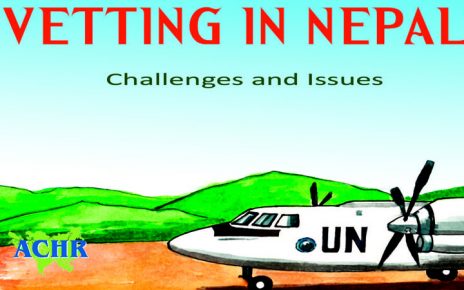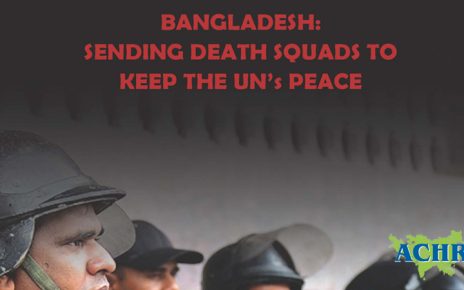Despite a return to democracy in December 1990, the Bangladesh Army remains “the power behind the throne” in Dhaka. Its control over the security forces is absolute. A large number of senior positions in the Bangladesh Navy and Bangladesh Air Force are served by Army officers as per Section 2A of the Army Act of Bangladesh. The Bangladesh Army also commands other paramilitary forces and at the time of the Pilkhana mutiny on 25 February 2009, out of the 446 officer positions in the Bangladesh Rifles (BDRs), 386 positions were occupied by deputed Army Officers. This situation remains unchanged – the Bangladesh Army officers continue to command the BDRs, now renamed as Border Guard Bangladesh (BGB). In fact, the Bangladesh Army has been engaged in civil policing since 26 March 2004 following the establishment of the RAB, a hybrid force drawn from the Bangladesh Police, Bangladesh Army, Bangladesh Navy, Bangladesh Air Force, Border Guard Bangladesh and Bangladesh Ansar. As of 27 August 2013, out of the 208 officers in the RAB, 114 were police officers, followed by 83 Army officers and 11 Air Force officers.
The United Nations (UN) peacekeeping work is a source of considerable national pride for Bangladesh. It is the second largest contributor to UN peacekeeping operations (UNPKOs) at present. About seven percent of the Bangladesh Army has been consistently deployed on UN peacekeeping missions since 2005. There is no transparency in the selection of peacekeepers from any of the forces in Bangladesh. To ACHRs knowledge, the Bangladesh government has not developed vetting policies, despite the introduction of “Human Rights Screening of United Nations Personnel” by the United Nations on 12 December 2012. This policy was recently communicated to troop and police contributing countries with a request that they put in place the necessary systems to uphold the new policy. There is an urgent need for Bangladesh as one of the largest troop contributing countries to develop such policy and make it publicly available.
Serving in a UN peacekeeping operation is a significant financial opportunity and indeed a life changing opportunity for those selected. At the UN standard rate, Bangladesh Army personnel earn upwards of US $2,200 a month for an officer and US $1,100 for a soldier, in addition to other allowances and perks. In comparison the average monthly pay for a soldier is Taka 7,717 (about US $100) and Taka 15,000 (about US $200) for an officer.
Not surprisingly, the Bangladesh Army has monopolised deployment in UNPKOs. The internal decision making for peacekeeping is at the hands of the Bangladesh Army. About 93 percent of all UN peacekeepers from Bangladesh are from the Bangladesh Army with Congo and Sudan being less with the percentage of army at 88 percent while Navy and Air forces had six percent representation. The remaining seven percent is being made up by the police.
In fact, the denial of opportunities to serve with the UN missions was one of the reasons for the revolt at the BDR Headquarters at Pilkhana, Dhaka on 25 February 2009 in which a total of 74 persons including 57 Army Officers deputed to the BDR from the army were massacred. The 10-member Investigation Committee14 formed by the Government of Bangladesh in its conclusion stated that the aims of the revolt by the BDR were, among others, “proving Bangladesh to be unfit for working in UN missions” and “reducing Bangladesh’s foreign currency earning by reducing its presence in UN missions”. The Investigation Committee, instead of resolving the grudge of the BDR personnel, appears to have misled the country by stating that the “United Nations has objected to the proposal of BDR members being taken to foreign missions. Bangladesh Government has no jurisdiction in this matter”.
This is a blatant lie as neighbouring India has been sending its paramilitary forces including the Border Security Forces on UN missions. The issue still remains unresolved as the Director General of the Border Guard Bangladesh (BGB, the new BDR) Major General Aziz Ahmed told The New Age on 25 February 2013 that “a decision on sending BGB soldiers to UN peacekeeping missions was under process”.
Participation in the UN peacekeeping missions also plays a role in national politics and economic development in Bangladesh. During the political instability in Bangladesh in December 2006 and January 2007, the UN reportedly warned Bangladesh Army that any extra constitutional action or involvement in one-sided parliamentary polls could jeopardise its participation in UN peacekeeping missions. The US Embassy’s cable from Dhaka released by Wikileaks stated that, “[t]he UN representative (protect) told the Ambassador that COAS Moeen had complained to her of the horrendous pressure he was under to step in, either under a State of Emergency or otherwise, and solicited a letter from the UN threatening loss of UNPKO duties should the military act extra-constitutionally. Moeen claimed that he could not “stick his neck out” and approach the President/Chief Adviser to beg off from any political role for the military without such benefit of proof of the dire consequences for the army.” The Bangladesh Army finally intervened and rule the country for about two years with a technocratic government.
Participation in UNPKOs has become the official raison d’etre for increasing the military expenditure of the country. Bangladesh indeed increased its defence budget by over 11% for the Financial Year 2011-12 as it had decided, among others, to purchase 44 new Main Battle Tanks (MBTs), three Armoured Recovery Vehicles (ARVs) and two brand new helicopters for the army to ensure necessary logistical support for UN peacekeeping activities.
Armed Forces personnel serving with UNPKOs are obligated to contribute to the Sena Kalyan Sangstha (SKS), a welfare fund of the Army. The fund runs a very large commercial arm for the armed forces. The military’s influence over governance and the administration gives the armed forces a competitive advantage over civilian commerce. It can therefore be argued that UN peacekeeping funds have contributed directly to the increasing militarization of the civilian commercial sector.
Sending death squads to keep the UN’s Peace
Bangladesh is very public about its commitment to the good conduct of its troops while on UNPKOs. Addressing the Plenary of the Sixth Committee of the 67th UNGA on “Criminal accountability of United Nations officials and experts on mission”, Dr. A K Abdul a UN meeting on criminal accountability of UN officials and experts on mission” on 15 October 2012, Dr. A K Abdul Momen, Ambassador and Permanent Representative of Bangladesh to the UN stated that “Bangladesh is committed to take all appropriate measures to ensure that crimes by United Nations officials and experts on mission do not go unpunished and that the perpetrators of such crimes are brought to justice, without prejudice to the privileges and immunities of such persons and the United Nations under international law, and in accordance with international human rights standards, including due process”.
These assertions are belied by the facts. This report documents cases where Bangladeshi servicemen, serving on UN mission in Sudan have committed acts of sexual abuse of children. These servicemen were repatriated. But there is little evidence of the kind of action promised by Bangladesh. This is unsurprising. Bangladesh may have paid lip service to zero tolerance but its national laws, including the Constitution, Criminal Procedure Code, Army Act, Air Force Act, Navy Ordinance, Armed Police Battalion Ordinance, in addition to others, contain provisions to shield State actors from prosecution and punishment.
Further at national level, the Bangladeshi security forces remain responsible for gross human rights violations. In clear violation of the Chittagong Hill Tracts (CHTs) Peace Accord of 2 December 1997, the Government of Bangladesh failed to withdraw about 470 army camps until today. Instead, the Army had launched ‘Operation Uttaron’ (Operation Upliftment) and ‘Operation Dabanol’ (Operation Wildfire) in 2001. Between 2004 and 2011, the Bangladesh Army working in support of illegal plain settlers was allegedly responsible for 15 cases of extrajudicial killings, 464 cases of arbitrary arrest, 374 cases of torture and 285 cases of forcible evictions in addition to burning down of 1,070 houses of indigenous Jumma peoples. Further, the Government of Bangladesh has forcibly acquired significant area of land for the expansion of cantonment, camps, Artillery Training Centers and Air Force Training Centers. The CHTs remains under de facto military rule and occupation.
In response to the mutiny at the BDR Headquarters at Pilkhana, Dhaka in February 2009, it is publicly known that the Government of Bangladesh allowed the Bangladesh Army to vent their angers on the captured/surrendered rebel BDR personnel for the killing of the Army officers during the mutiny. In less than three months after the mutiny, on 21 May 2009, the Government of Bangladesh was forced to order an inquiry into the deaths of 21 BDR personnel who were held in custody after the mutiny. This inquiry report has not been made public but Odhikar stated that by September 2009 at least 47 BDR personnel had died while in the custody of the RAB and Bangladesh Army. The Economist in its issue on 9 November 2013 stated, “at least 70 suspects died while in custody—almost certainly murdered”.
Further, the RAB has been described as death squads for committing numerous extrajudicial executions. According to a leading Bangladeshi human rights organization, Odhikar, a total of 776 persons were killed in what the RAB described as “crossfire” between January 2004 and June 2013, of which majority were extrajudicial executions. The RAB has been “ineligible to receive training or assistance’ under laws which prohibit American funding or training for overseas military units which abuse human rights with impunity.” In fact, continuing gross violations of human rights by the RAB led to the unusual public statement in September 2011 by former Prime Minister and now leader of the opposition Ms. Khaleda Zia, who indeed established the RAB, calling for all RAB personnel to be banned from UN Peacekeeping duties.
Given the lack of political capacity to control the Army, a compliant and corrupt justice system and effective legal immunity provided to the Army and other law enforcement personnel, the members of death squad of Bangladesh have essentially been enjoying impunity.
The United Nations must not ignore the call made by Ms Khaleda Zia. It is unacceptable that the Government of Bangladesh should forward members of its death squad for UN peacekeeping. It is equally unacceptable that the UN should accept the RAB personnel into UN peacekeeping missions.



